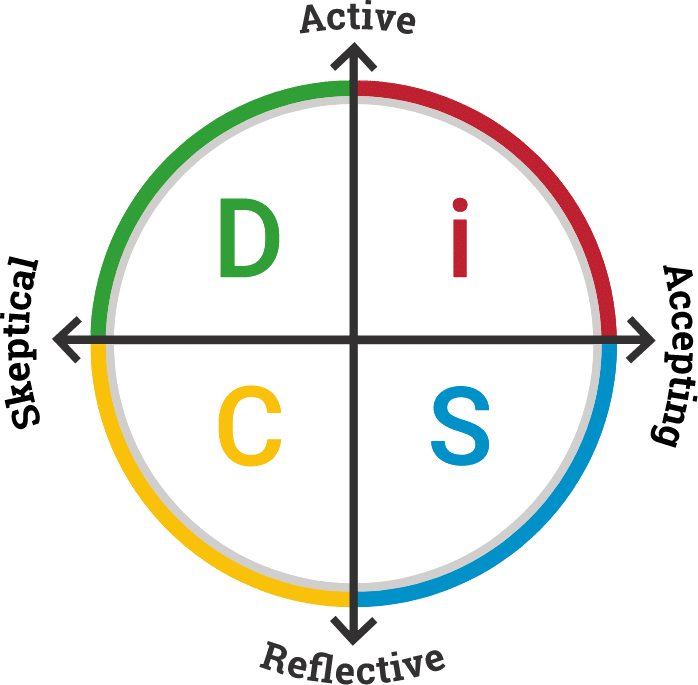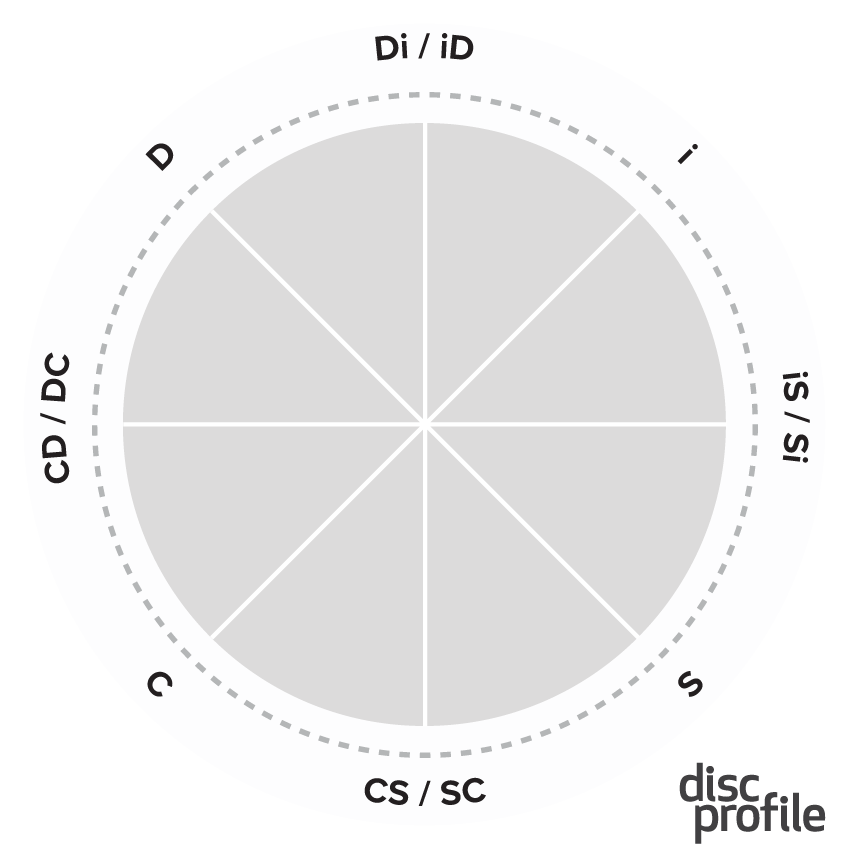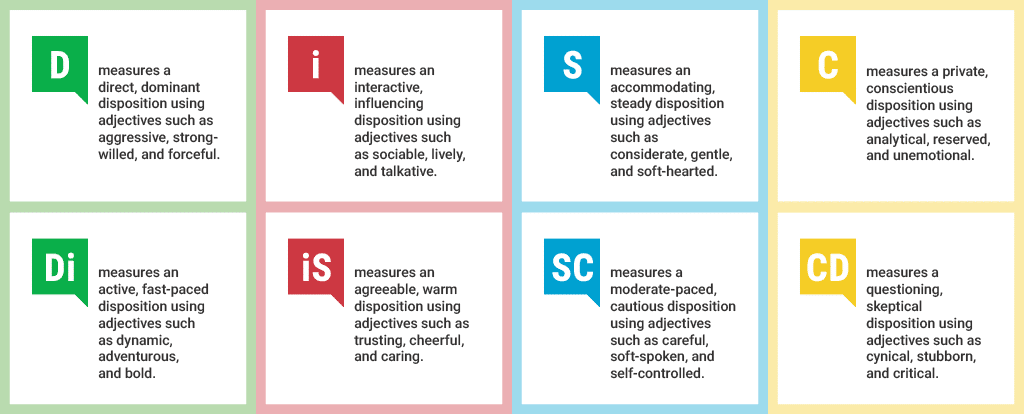DiSC D-type personalities
Dominance:
direct, strong-willed, and forceful (fast-paced and skeptical)
DiSC D-style people tend to be fast-paced and outspoken. They also display questioning and skeptical traits. You’ll notice the D-style acting assertively, making quick decisions, and speaking candidly.
DiSC i-type personalities
Influence:
sociable, talkative, and lively (fast-paced and accepting)
You can often recognize i-style people by their outgoing energy, optimism, warmth, and gift of gab. They seek new experiences rather than routine, and care a great deal about their relationships with others.
DiSC S-type personalities
Steadiness:
gentle, accommodating, and soft-hearted (cautious and accepting)
S-style people tend to be more reflective than outspoken. They are warm, sincere, and accepting personalities. If you want someone to listen patiently to you, this might be the person you go to.
DiSC C-type personalities
Conscientiousness:
private, analytical, and logical (cautious and skeptical)
C-style people value high standards, careful analysis, and diplomacy. They excel at bringing an objective lens to various situations, and care about demonstrating their competency.

What does DiSC measure?
Everything DiSC assessments measure a few important personality traits. The vertical dimension goes from fast-paced and outspoken to more cautious and reflective. The horizontal dimension goes from questioning and skeptical to accepting and warm. These measurements can tell us a great deal about our preferences and tendencies.
The Everything DiSC circle
The dot shows your style and inclination. The closer your dot is to the middle, the less inclined you are toward that style.
The shading indicates your comfort zone. If there’s little or no shading in part of the circle, that means you will have to put forth more effort in displaying behaviors characteristic of that style.
Priorities
The priorities around the circle are an additional measurement. It helps you interpret your shading. Everyone gets at least three priorities, but you can also have four or five.
In the example shown, the person has the three priorities typical of the DC style (accuracy, challenge, results) and also the priority of enthusiasm (more often associated with people who have i styles). They are moderately inclined toward the DC style, perhaps agreeing less strongly with the style’s descriptions than someone with a dot closer to the edge.
DiSC makes it easy to see yourself on a scale of behaviors and traits without being boxed into a single category. It empowers you to embrace what fits, while acknowledging that everyone—even people with your same style—is different.
It’s important to understand that all DiSC styles are equally valuable and everyone is a blend of all four styles. Your personal style is also influenced by factors such as life experiences, education, and maturity.

8 scales, 12 types
The four primary styles are a way of simplifying the model to make it more memorable. However, Everything DiSC assessments allow for finer differentiation among styles than just the four main types.
When you complete an Everything DiSC questionnaire, you are scored on eight scales, not four. Those eight scales are D, Di/iD, i, iS/Si, S, SC/CS, C, CD/DC. Your scores on these eight scales determine your style. Some people will have the styles D, i, S, or C, but others will have styles such as Di or SC.
How you answer questions related to the eight scales helps determine your style. If you answer more questions that reflect the iS and S scales, for example, your style will be scored as an Si.

A quick overview of the 12 Everything DiSC styles
D styles
Active & skeptical
D
Forceful and direct, seeks bottom-line results, values victory. Could increase effectiveness through patience, empathy.
Di
Convincing and daring, seeks new opportunities, values quick action. Could increase effectiveness through patience, humility, consideration of others’ ideas.
DC
Resolute and strong-willed, seeks independence, values personal accomplishment. Could increase effectiveness through warmth and tactful communication.
i styles
Active & accepting
i
Highly sociable and lively, seeks popularity, values optimism. Could increase effectiveness through being more objective and following through on tasks.
iS
Upbeat and lighthearted, seeks friendship, values empathy. Could increase effectiveness through acknowledging others’ flaws and confronting problems.
iD
Animated and inspiring, seeks excitement, values bold action. Could increase effectiveness through focusing on the details, showing patience, listening to others.
S styles
Reflective & accepting
S
Pleasantly calm and accommodating of others, seeks stability, values harmony. Could increase effectiveness through displaying self-confidence and revealing true feelings.
Si
Supportive and agreeable, seeks acceptance, values close relationships. Could increase effectiveness through saying “no” if necessary and addressing issues.
SC
Modest and unassuming, seeks consistency, values steady progress. Would increase effectiveness through initiating change and speaking up.
C styles
Reflective & skeptical
C
Analytical and private, seeks objective processes, values accuracy. Could increase effectiveness through acknowledging others’ feelings and looking beyond data.
CS
Quiet and self-controlled, seeks reliable outcomes, values practicality. Could increase effectiveness through showing flexibility, being decisive, and showing urgency.
CD
Unsentimental and matter-of-fact, seeks efficiency, values strict standards. Could increase effectiveness through cooperation and paying attention to others’ needs.
Everything DiSC Cornerstone Principles
- All of the DiSC styles are equally valuable and everyone is a blend of all four styles.
- Your work style is also influenced by other factors such as life experiences, education, and maturity.
- Understanding yourself better is the first step to becoming more effective when working with others.
- Learning about other people’s DiSC styles can help you understand their priorities and how they may differ from your own.
- You can improve the quality of your workplace by using DiSC assessments to build more effective relationships.
Popular DiSC assessments
Can you pass this test on DiSC styles? How much do you know about the D, i, S, and C styles?
Everything DiSC learners always have questions. We answer several of them here.
The traditional way to represent the DiSC model is a line-graph format, allowing for the Appraiser and Achiever patterns. Everything DiSC portrays these results a bit differently.
